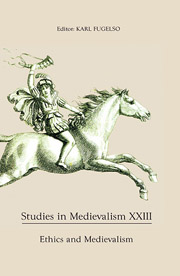Book contents
- Frontmatter
- Acknowledgments
- Contents
- List of Illustrations
- Epigraph
- Editorial Note
- I Ethics and Medievalism: Some Perspective(s)
- The Dangers of the Search for Authenticity? The Ethics of Hallowe'en
- Living Memory and the Long Dead: The Ethics of Laughing at the Middle Ages
- Justice Human and Divine: Ethics in Margaret Frazer's Medievalist Dame Frevisse Series
- The Song Remains the Same: Crossing Intersections to Create an Ethical World via an Adaptation of Everyman for Everyone
- Bringing Elsewhere Home: A Song of Ice and Fire's Ethics of Disability
- The Ethical Movement of Daenerys Targaryen
- II Interpretations
- Contributors
- Previously published volumes
Bringing Elsewhere Home: A Song of Ice and Fire's Ethics of Disability
from I - Ethics and Medievalism: Some Perspective(s)
Published online by Cambridge University Press: 05 May 2014
- Frontmatter
- Acknowledgments
- Contents
- List of Illustrations
- Epigraph
- Editorial Note
- I Ethics and Medievalism: Some Perspective(s)
- The Dangers of the Search for Authenticity? The Ethics of Hallowe'en
- Living Memory and the Long Dead: The Ethics of Laughing at the Middle Ages
- Justice Human and Divine: Ethics in Margaret Frazer's Medievalist Dame Frevisse Series
- The Song Remains the Same: Crossing Intersections to Create an Ethical World via an Adaptation of Everyman for Everyone
- Bringing Elsewhere Home: A Song of Ice and Fire's Ethics of Disability
- The Ethical Movement of Daenerys Targaryen
- II Interpretations
- Contributors
- Previously published volumes
Summary
As essay after essay in this series has reminded us, the term “neomedievalism” is too multivalent and maddeningly complex to define with any satisfaction: any attempt to create a definition invariably oversimplifies the concept or distorts it to fit current needs. In the case of neomedievalism, rather than attempt another iteration of an Ur-definition, Carol R. Robinson and Pamela Clements have done invaluable work in creating a field guide to understanding the characteristics of neomedievalism. In brief, we can call a text neomedieval when it does one or more of the following:
It is playful or ironic in nature.
It calls attention to its own construction, often as a work of bricolage.
It deliberately shatters any possibility for a “sealed world” of the text.
It refuses the nostalgic fantasy of being able to retrieve the medieval past.
Its task is to create a conscious vision of an alternative universe.
This last item holds the most promise as a way of reading George R. R. Martin's multi-volume A Song of Ice and Fire as a text concerned with particular ethical issues surrounding disability: the damage ableist discourses and narratives inflict on the disabled.
In the landmark case Arline vs. Nassau County, Justice William J. Brennan, Jr., summarizing the need for an inclusive definition of disability, noted the problems that narratives of disability posed for the disabled: “society's accumulated myths and fears about disability and disease are as handicapping as are the physical limitations that flow from actual impairment.”
- Type
- Chapter
- Information
- Studies in Medievalism XXIIIEthics and Medievalism, pp. 45 - 60Publisher: Boydell & BrewerPrint publication year: 2014



